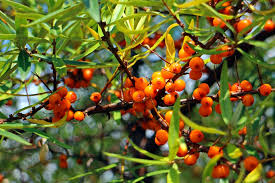Rhamnus purshiana (cascara buckthorn, cascara, bearberry, and in the Chinook Jargon, chittem and chitticum; syn. Frangula purshiana, Rhamnus purshianus) is a species of buckthorn native to western North America from southern British Columbiasouth to central California, and eastward to northwestern Montana.
Contents
Uses
It was used traditionally as an herbal laxative by various Native American Indian tribes. These tribes passed their knowledge of this medicinal herb then on to the Spanish explores.
The active constituents in cascara sagrada are hydroxyanthraquinone glycosides called cascarosides. These cascarosides have a cathartic effect by inducing muscular contraction called peristalsis in the large intestine, encouraging a bowel movement.
Benefits
Cascara sagrada is the main ingredient in many laxative products on the market today and it is thought to be the most effective herb for colon cleansing available. It is mild enough to use after anal or rectal surgery or for use in the elderly. Because of its mild laxative properties, this herb is often used for treating chronic constipation.
Cautions
Fresh cascara sagrada will cause gastrointestinal irritation, resulting in nausea, vomiting, diarrhea, and intestinal spasms.
The bark should be obtained from trusted sources to ensure proper aging; it should be aged for at least a
year, or baked in an oven for several hours at 250 degrees until completely dry.
Do not use the herb if there are existing ulcers, colitis, or any other gastrointestinal conditions. Use caution if pregnant or nursing. As with any herbal supplement or remedy, consult a qualified physician before using cascara sagrada.
Interactions
- Anticoagulants: Theoretically, cascara may potentiate anticoagulant therapy by reducing absorption of vitamin K from the gut.
- Corticosteroids: Concomitant use of corticosteroids with cascara may increase the risk of potassium depletion.
- Digitalis glycosides, digoxin: Cascara may inhibit the absorption of digitalis glycosides, and decrease their cardiac action. However, cathartic-induced hypokalemia increases the toxicity and potency of absorbed digitalis.
- Diuretics: Theoretically, concomitant use of cascara with diuretics may cause excessive loss of potassium.
- Isoniazid, sulfisoxazole: Laxative-induced diarrhea may result in decreased absorption of isoniazid or sulfisoxazole.
- Oral medications: The cathartic action of cascara may hasten the passage of all oral medications through the gut, thereby inhibiting their action.
- Potassium depleting drugs: Theoretically, concomitant use of cascara along potassium depleting drugs can increase the risk of potassium depletion.
- Stimulant laxatives: Concomitant use of cascara with other laxatives may theoretically cause electrolyte and fluid depletion.
Other names
cascara buckthorn, cascara, bearberry, and in the Chinook Jargon, chittem and chitticum; syn. Frangula purshiana, Rhamnus purshianus
References
Source: Wikipedia, https://en.wikipedia.org/wiki/Rhamnus_purshiana
HerbalSupplement, http://www.herbal-supplement-resource.com/cascara-sagrada-herb.html
Fullspectrumhealth, http://www.fullspectrumhealth.com/ns/DisplayMonograph.asp?StoreID=xu1fpc6w3ksr2lhd0g03n0et95su9lub&DocID=basic-interactions-cascara

